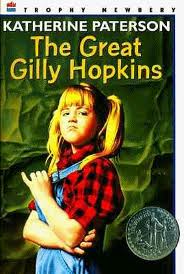The Great Gilly Hopkins by Katherine Paterson
Reviewed by Bridget

Ratings Explanation
Language: Gilly’s speech is laden with hell and damn for shock value, as she tries to ruffle her religious foster mother. She also liberally uses derogatory terms regarding race – “colored” and learning disabilities – “retarded”.
Violence: Gilly fights a group of boys on the playground and is sent to the principal’s office.
Adult Themes: Gilly is a child who is neglected by her real mother. She is very lonely and desires to be wanted and loved. She recounts her sad history of foster families.
Synopsis
Galadriel Hopkins “Gilly” is an eleven year old foster child, who has been bouncing through foster families her entire life. Gilly wants a home of her own. She wants her mother, Courtney Rutherford Hopkins to come get her. Gilly finds herself assigned to yet another foster family. Maime Trotter already cares for a foster child, W.E. (William Ernest), a young boy with a learning disability. Gilly is disgusted by the new situation. She claims Maime Trotter is illiterate, W.E. is retarded, and is stunned to learn she will be sharing dinner each night with Mr. Randolph, an older, blind, black gentleman. Gilly then steals cash from Mr. Randolph and Maime Trotter, packs her bags and heads for the bus station. She tries to purchase a one way ticket to California to be with her mother. Gilly is caught at the bus station and Maime Trotter does not press charges. Gilly then writes a letter to her mother negatively describing her foster situation. In the meantime, Mr. Randolph, W.E. and Maime Trotter become endeared to Gilly. Gilly’s desires to be wanted and loved are being met with Maime Trotter, W.E. and Mr. Randolph.
Her grandmother who was not aware of Gilly’s existence, receives a letter from Courtney requesting that she raise Gilly. The grandmother collects Gilly. Gilly is laden with remorse for having written the letter, she does not want to leave. Gilly moves in with her grandmother, and sorely misses Maime Trotter, Mr. Randolph and W.E. She then meets her mother, a flower child, for the first time. Gilly is devastated to learn that her mother has absolutely no interest in raising Gilly.
I did enjoy reading Gilly’s story. However, this book is laden with many difficult issues such as foster children, racial prejudice, and disabilities. I plan on reading this book aloud with my children, to ensure that these issues are addressed throughout the course of the book.
©2009 The Literate Mother








